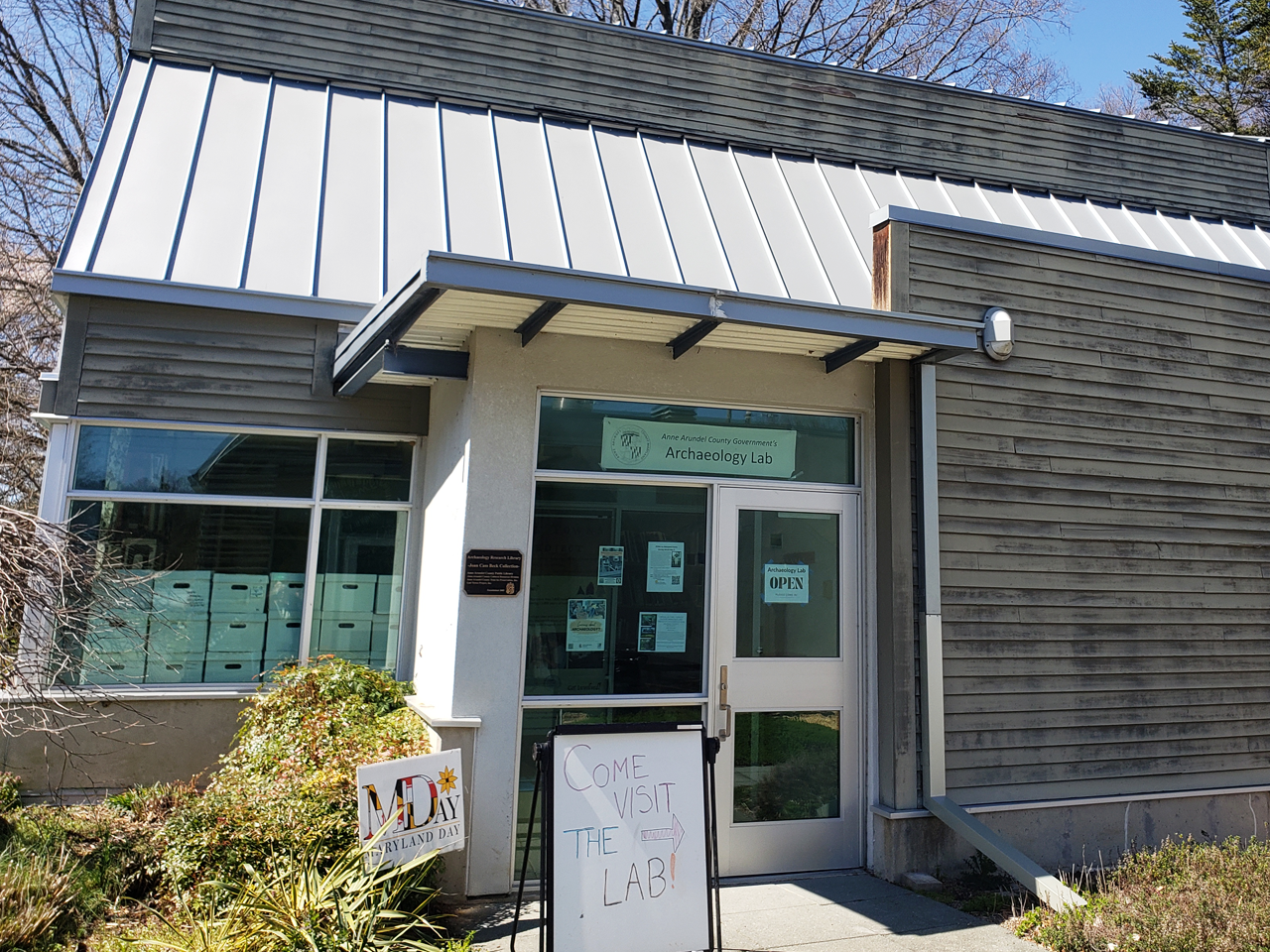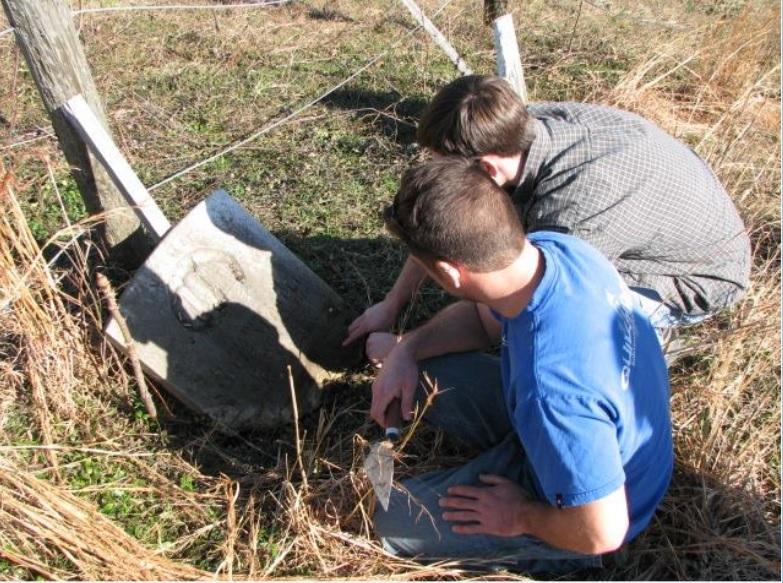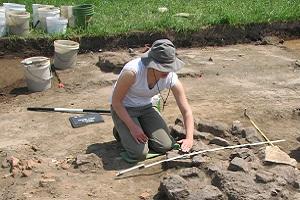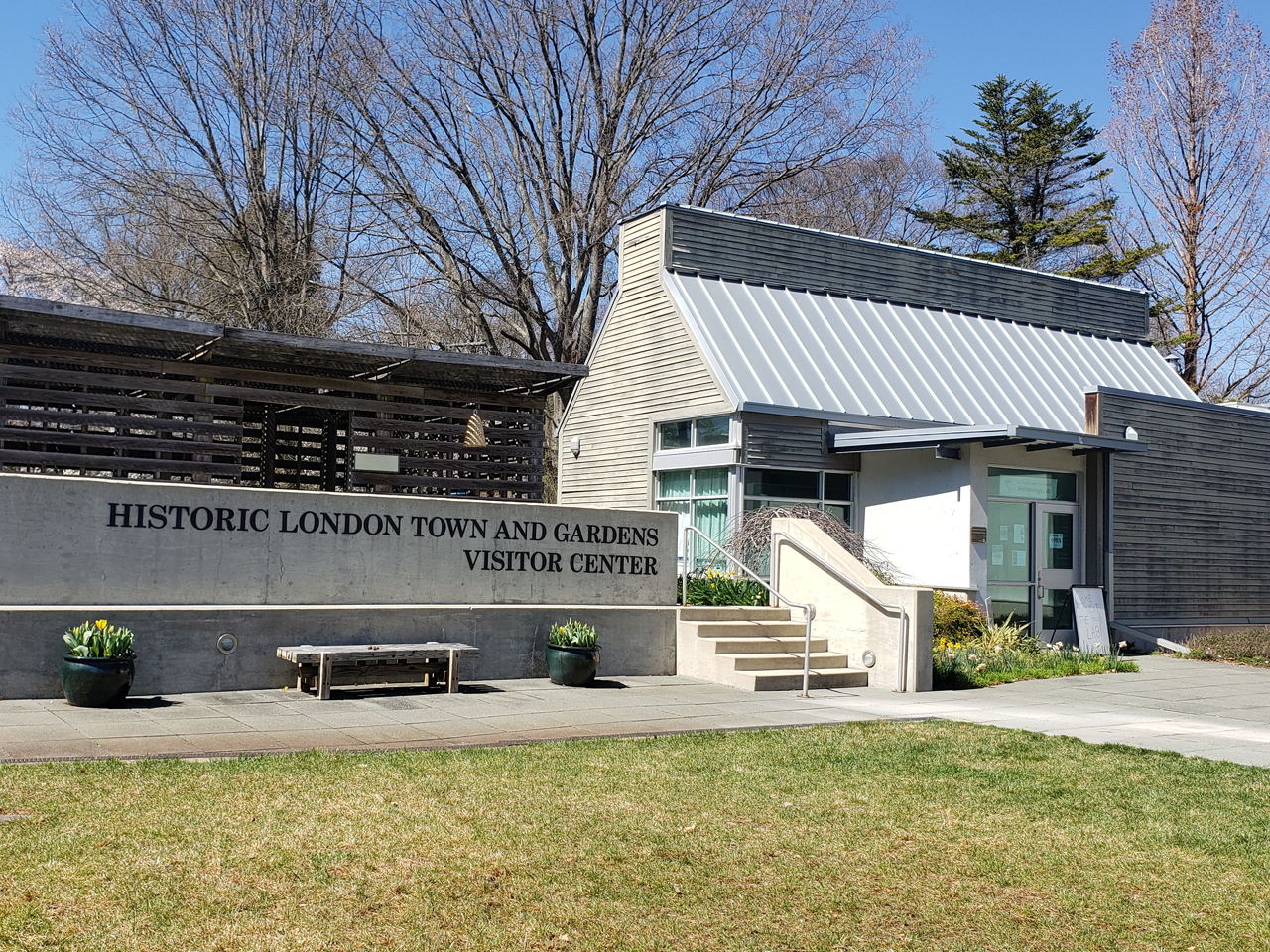The Historic Preservation Planning Section conducts archaeological research, survey, and implements the County Code to preserve significant archaeological sites. Many hands-on volunteer and learning opportunities are offered throughout the year.
Fieldwork
Want to learn what it's like to be an archaeologist? Volunteers and interns are invited to join Cultural Resources personnel on a variety of archaeology digs across Anne Arundel County. The County has over 1,700 archaeological sites, so locations vary depending upon the current research program and the seasons. Tasks may include digging, screening for artifacts, and documenting the excavations. Check out our field manual here. No Experience Needed. Children under 16 must be accompanied by an adult.
Labwork
The Anne Arundel Archaeology Laboratory, located on the campus of Historic London Town & Gardens in Edgewater, Maryland, accepts volunteers and interns to help process artifacts, including washing, labeling, sorting, and cataloging. Check out our lab manual here. No Experience Needed. Children under 16 must be accompanied by an adult. Currently, the lab is open Tuesday through Thursday, 10:00 a.m. - 3:00 p.m.
Volunteers must sign up here in advance for a morning or afternoon shift.
Research
Volunteers are also needed to assist with archival research both online and at the Maryland State Archives. Before beginning excavations at an archaeology site, one must research land records, census data, wills. probate inventories, and historic maps, all of which helps formulate research questions and better understand the historic context of these resources. In addition, archaeological and historical literature must be consulted as part of the research process.
The Joan Cass Beck Collection, a special collection of the Anne Arundel Public Library System, contains hundreds of books, journals, and audio/visual materials that are housed at the Anne Arundel Archaeology Lab and at the Historical Preservation Research Library in the county's Division of Planning and Zoning. The library is open to the public for onsite research by appointment only and the books cannot be checked out. Call (410) 222-1318 for more information.
Email Drew Webster at pzwebs00@aacounty.org for information on current and upcoming opportunities and to sign up for the Preservation Stewardship Program.
Contact us if you are interested in making a donation, wish to see some of the collection, are a researcher, or you are an archaeologist transferring collections as a result of a compliance project. To make an appointment for any collection inquiries, please contact the Lab manager, Jenn Babiarz, at pzbabi22@aacounty.org or call the lab at 410-222-7486.
The Joan Cass Beck Collection, a special collection of the Anne Arundel Public Library System, contains hundreds of books, journals, and audio/visual materials that are housed at the Anne Arundel Archaeology Lab and at the Historical Preservation Research Library in the county's Division of Planning and Zoning. The library is open to the public for onsite research by appointment only and the books cannot be checked out. Call 410-222-1318 for more information.
-
 Archaeology Laboratory & History Resources Center
Archaeology Laboratory & History Resources CenterThe Historic Preservation Planning Section maintains a public archaeological laboratory at the Historic London Town and Gardens.
-
 Volunteer Opportunities & Events
Volunteer Opportunities & EventsSign up for our newsletter and mailing list to learn more about our volunteer opportunities or events.
-
 Citizen Preservation Stewardship Program
Citizen Preservation Stewardship ProgramLearn about current opportunities through our Preservation Stewardship Program.
Archaeological Sites Review
Per Anne Arundel County Code Article 17-6-502 and 17-6-503, our office reviews each development project to determine the effect of the proposed action on significant archaeological sites. Each review determines whether there are known archaeological sites or a high potential for significant archaeological sites. Known sites are those that are listed on or eligible for the Maryland Archaeological Sites Survey and the National Register of Historic Places. A suite of historic maps assist in the evaluation of historic site potential. The location of known sites is generally kept as restricted access to prevent looting. If there are known archaeological sites or a high potential for significant archaeological sites, the subdivision applicant conducts a "Phase I" archaeological survey to determine the nature and number of archaeological sites.
With more than 1,300 sites, Anne Arundel County has more recorded archaeological sites than any other county in Maryland. Many more, however, remain to be discovered. The assessment of archaeological potential for unknown sites is generally based on topographic and environmental settings and known resources in the vicinity. Prehistoric sites are generally found within 500' of potable water (which may include extinct springs), on flat, well-drained soils, and in areas of ecological diversity. The highest potential for such sites is along the tidewater or the Patuxent and its tributaries. The same factors are operable for early colonial period sites. Later historic sites can be found in more wide-ranging locales such as farmsteads or homes along old roads or railroads.
Archaeological investigations must be performed under the supervision of qualified professionals meeting standards outlined by the National Park Service in 36 CFR 800 of the National Historic Preservation Act. If archaeological sites are found as a result of a Phase I investigation, then the applicant, using qualified professionals, shall conduct further investigations to determine the level of significance. This is a Phase II investigation. If the sites are determined not significant, then the proposed development may proceed.
If the sites are determined to be locally significant (i.e., have intact features and further information value), then the applicant shall revise plans so that development avoids the archaeological sites and a preservation easement shall be required. If you require more information, please feel free to contact our office.
In the unusual event that preservation-in-place would prohibit fair use of the property, then additional work or mitigation may be required, i.e. an approved data recovery investigation prior to disturbance or destruction - this instance is called a Phase III archaeological mitigation. View a summary of these phases of investigation. Find additional information, forms and guidelines below.
If you have any questions, get in touch with the County's Archaeological Sites Planner, Anastasia Poulos, at pzpoul44@aacounty.org.
Archaeology Forms and Guidelines
The Cultural Resources Section has a number of resources, guidelines, and forms available below for download related to compliance projects, the archaeological collections, and the Preservation Stewardship Program.
- Artifact Donation Form
- Archaeological Collections Curation Guidelines (Donation Instructions)
- Collection Transmittal to AACo - Submission Form (Part 1 of 2)
- Collection Transmittal to AACo - Box Inventory Form (Part 2 of 2)
- Owner Request Form - Transmittal from AACo Collection
- Quit Claim Deed of Gift
- Maryland Standards and Guidelines for Archaeological Curation
- Guidelines to Conducting Archaeological Investigations for Anne Arundel County
- Anne Arundel County Code - Article 17
- Standards and Guidelines for Archaeological Investigations in Maryland
- Maryland Standards and Guidelines for Archaeological Curation
- Federal Standards and Guidelines for Historic Preservation and Archaeology
- Federal Standards for Professional Qualifications in Archaeology

